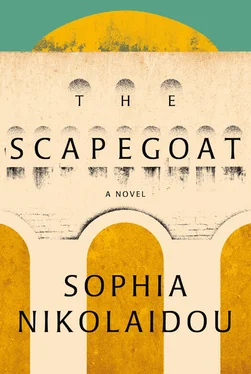At first Teta complained, did he really have to leave home just to study for his exams, or was he just flying a flag of independence? She was annoyed at her mother for siding again with her son. But Tasos shot her an angry look, tossed out a couple of choice phrases, reporter’s language, the kind he usually saved for meetings at the newspaper. Teta let the issue drop. After all, the most important thing was her son and his exams, she didn’t have the energy to bicker with her husband.
Meanwhile Minas set up shop in his grandmother’s dining room. He studied there, ate all his meals there. The farthest he strayed was the bathroom, just far enough to shake out his legs, and then back to work.
He stopped complaining about the memorization, he’d made his peace with it. He realized there are more important things at stake , whispered his grandmother, who impressed upon him that memorization was in fact a creative means of letting important things resonate . His body became an amplifier. He even refrained from commenting on the content he had to memorize, all the stupid shit he would have to be able to reproduce in order to achieve the desired result.
— That child is a creature of extremes, Teta remarked over the phone, and Evthalia agreed, pleased.
At night he would go out and walk around the block. Evthalia had seen him from her balcony hopping over the wall of Agia Sophia. What he did in there, she had no idea.
One night when Minas had gone out, she raised her eyes and looked slantwise at Dinopoulos’s top-floor apartment on the opposite corner. The living room lights were on, so he must still have been up. She hurriedly lowered the blinds and put some tsipouro and honey on to boil according to Tasos’s recommended dosage.
Minas was gone for ages, and when she finally heard the elevator coming back up, Evthalia crossed herself. She had promised the Virgin that she would take communion three Sundays in a row, as long as the child came home safe. Before she started calling around to all the hospitals.
— There you are.
Bright red cheeks, glazed eyes, the biggest smile she’d ever seen.
— Hi, Grandma, Minas said, taking off his shoes in the entryway.
Evthalia was dying to ask him.
— Were you with someone? she said with feigned nonchalance.
Minas smiled.
— With Evelina. We thought we’d take a break. It’s Saturday. Besides, he added, imitating his grandmother’s voice, well-considered breaks produce superlative work.
Evthalia smiled. Proper use of the passive participle of the present perfect and of the superlative “superlative.” That was her Minas.
— What did you talk about for so long? she asked, her eyes trained on the TV screen. She was lying on the sofa under a checked blanket she got for free with a box of detergent. There was a mystery on, and the scene was just beginning when the detective would finally unraveled the plot.
— Nothing.
— For three hours?
— For three hours.
— So what did you do?
— We kissed.
He needed to tell someone, and he did.
SOUK
Souk’s graduate education had been a trial-by-fire affair. Asteriou knew how to push his students to the limit, to test their resistance and resilience, to provoke them and bring them right to the heart of the matter. No matter how hard he tried to scrape off the residue of Asteriou’s pedagogy, his own method was troublingly similar to his professor’s. He didn’t believe that knowledge came without a fight.
Minas would have to prove his mettle, tear his wings on the Sympligades. That was the only way he would get to where he was going — or so his teacher believed, having generalized his own personal example into a rule of thumb. Obstacles excited Souk, and so did hard work. But the boy was made of other stuff, even if Souk couldn’t see that: focused on the similarities, he overlooked the differences. It wasn’t only the decades that separated them — YouTube, Facebook, the low-slung jeans that looked like they might fall down at any moment — but also what each of them was made of.
In the commotion following the end of the quarter, Minas decided to take the exams — though in doing so he overturned all of his previous declarations. That’s how kids are , Evthalia told her daughter with a smile, they say things and unsay them the next minute, there’s no point in ever taking them at their word . She wasn’t the least bit interested in the reason for the change, whether it had been his teacher’s pedagogical strategy or the depth of Evelina’s kisses. She wasn’t blind, she saw Minas come home from his nightly walks with swollen lips and eyes staring off into space. How he ever got back to work was a mystery.
And yet he did. His mind was a sponge that soaked up rules and exceptions, figures, diagrams, every wrongheaded statement his textbooks contained. Souk thought it was because the blood price had been paid, and the young man finally realized what was at stake. And, of course, because he’d tasted the fruit of knowledge, reached out a hand and touched the tree of good and evil. Fireworks had gone off in his brain — and after you’ve experienced that feeling, there’s no going back.
Souk thought Minas was born to go places. Souk divided all of humanity into two categories. He and Fani belonged to category of people who make things. The other was for everyone else, for people who just sat around all day. Nothing really got under their skin. What they aspired to was a carefree life.
It annoyed Souk that Minas was letting his talents go to waste. There were people with half his brain who managed to accomplish five times as much. But Minas didn’t dance to the same rhythm as other people did. If you stray from the sheepfold the wolf will eat you , said people who were wise in the ways of the world. Souk himself knew the high cost of straying from the sheepfold. But he also knew he wouldn’t get anywhere trying to give advice. Experience isn’t something you can share.
EVTHALIA
Evthalia believed that romance was a sickness of the young. She’d never thought much of it, she shook herself free of that kind of love early on. She didn’t like to feel her legs trembling beneath her, or that haziness in her head. She could still remember how her heart used to pound, as loud as thunder. She would see him walking toward her nonchalantly, but Evthalia was convinced he could hear her heart from a distance, because he swung his lawyer’s briefcase to the rhythm as he rushed to greet her.
At the end of the day, he was the one who’d been in such a hurry to get married, and to Froso of all people, my Lord, a girl as silly as they come. Evthalia never forgave him for it. But she swallowed the insult as best she could — after all, they had never exchanged promises, only looks, which is to say nothing at all. And the more she saw Froso mopping her balcony, the very image of a perfect housewife, the more she counted her lucky stars. Love comes and goes, it fizzles out and leaves your heart barren. She wasn’t cut out for that kind of adventure. She liked to know where her next footstep would land, to be wrapped in a cocoon of order. She lived for small things: a glass of tsipouro by the sea, teaching a beautiful poem in class. Big things frightened her. She knew that life isn’t served on a platter, she had learned that lesson early on — it’s just struggle and more struggle. She cinched her heart and moved on. She began each day in a suit of armor: a severe smile and a handbag full of textbooks. Plato and Cicero, ancient wise men who were above suspicion, who taught her a great deal, which she in turn taught to her students. Concepts, rhetorical structures, the layers of commentary — in the classroom she was unstoppable. She chewed gum, which her students liked and her colleagues didn’t. Yet she kept chewing her gum and testing her students according to a rubric of her own devising, with fractions of a point earned or subtracted for reasons comprehensible only to her. And while she prepared for each class with outlines and notes, in the classroom she had a genius for putting all that aside, improvising answers and questions, talking about anything and everything, particularly prohibited subjects such as love and politics. The students at the girls’ school put away their mirrors; at the boys’ school they would do anything for her, they even studied the pages on syntax at the back of their Greek textbook, because she’d convinced them it was a crying shame that young men two meters tall could solve multivariable equations but couldn’t diagram a sentence if their lives depended on it.
Читать дальше












